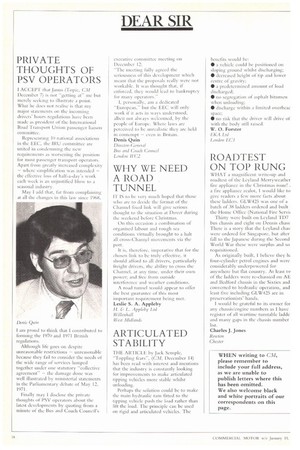PRIVATE THOUGHTS OF PSV OPERATORS
Page 18

If you've noticed an error in this article please click here to report it so we can fix it.
I ACCEPT that _Janus (Topic, CM December 7) is not "getting at me but merely seeking to illustrate A point. What lie does not realise is that my major statements on the incoming drivers' hours regulations have been made as president of the International Road Transport Union passenger liaison CO1]]IIlIttLC.
Representing 10 national associations in the EEC, the I RU committee arc united in condemning the new requirements Is worsening the position for most passenger transport operators. Apart from greatly increased complexity — where simplification was intended — the effective loss of hall-a-dav's work each week is an unjustified blow to a seasonal industry.
May 1 add that, far from complaining at all the changes in this law since 1968, I am proud to think that I contributed to forming the 1970 and 1971 British regulations.
Although life goes on despite
unreasonable restrictions — unreasonable because they fail to consider the needs of the wide range of services lumped together under one statutory "collective agreement" — the damage done was well illustrated by ministerial statements in the Parliamentary debate of May 12, 1971.
Finally may I disclose the private thoughts of PSV operators about the latest developments by quoting from a minute of the Bus and Coach Council's executive committee meeting on December 12: "The meeting Cully agreed the seriousness of this development which meant that die proposals really were not workable. It was thought that, if enforced, they would lead to bankruptcy for many operators.
I. personally, am a dedicated "European,but the EEC will only work if it acts in ways understood, albeit not always welcomed, by the people of Europe. Where laws are perceived to be unrealistic they are held ill contempt — even in Britain. Denis Quin
Direct oiera Bits and Coach Conncil London WC2
WHY WE NEED A ROAD TUNNEL
IT IS to be very much hoped that those who are to decide the format of the Channel fixed link will give serious thought to die situation at Dover during the weekend before Christmas.
On this occasion a combination of organised labour and rough sea conditions virtually brought to a halt all cross-Channel movements via the port.
It is, therefore, imperative that for the chosen kink to be truly effective, it should afford to all drivers, particularly freight drivers, the ability to cross the Channel, at any time, under their own power; and free from outside interference and weather conditions.
A road tunnel would appear to offer the best guarantee of this most Unportant remnrenient being met. Leslie S. A. Appleby H. I.. Appleby 1.tri West .11idiands
ARTICULATED STABILITY
THE ARTICLE by Jack Semple, "Toppling Fears-, (Cl.!, December 14) has been read with interest and mentions that the industry is constantly looking for improvements to make articulated tipping vehicles more stable whilst unloading.
Perhaps the solution could be to make the main hydraulic rani fitted to the tipping vehicle push the load rather than lift the load. The principle can be used on rigid and articulated vehicles. The benefits would he:
• a vehicle could be positioned on sloping ground whilst discharging; • decreased height of tip and lower centre of gravity:
• a predetermined amount of load discharged; • no segregation of asphalt bitumen when unloading: • discharge within a limited overheae space;
• no risk that the driver will drive of
with the body still raised.
W. 0. Forster iiKA Ltd
London EC I
ROADTEST ON TOP RUNG
WHAT a magnificent write-up and roadtest of the Leyland Merryweather tire appliance in the Christmas issue! a fire appliance zealot. I would like to give readers a few more facts about these ladders. GLW425 was one of a batch of 38 ladders ordered and built the Home Office (National Fire Servi,
Thirty were built on Leyland TD7 bus chassis and eight on Dennis chass: There is a story that the Leyland chas! were ordered for Singapore, but after fall to the Japanese during the Second World War these were surplus and so requisitioned.
As originally built, 1 believe they lu four-cylinder petrol engines and were considerably underpowered for anywhere but flat country. At least tv of the ladders were re-chassied on A E and Bedford chassis in the Sixties and converted to hydraulic operation, and least five including GLW425 are in preservationists' hands.
would be grateful to its owner for any chassis/engine numbers as I have register of all wartime turntable lad& and many gaps in the chassis number list.
Charles J. Jones
Rowton






















































